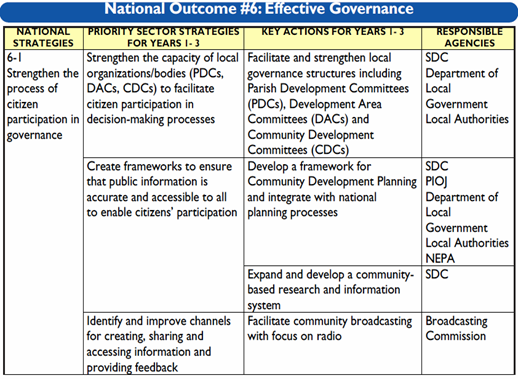- Español
Guide of Strategies and Mechanisms for Effective Public Management (GEMGPE) - Jamaica

Civil society participation in public management

In recent years governance has become central to the achievement of many of the national objectives in Jamaica. Since Independence in 1962, Jamaica has developed a better understanding of what good governance is and its importance to sustainable development. Jamaica continues to make strides towards improving the 'face' of governance.
Various initiatives and programmes are being led by the Cabinet Office and its Public Sector Modernisation Division that include the active participation of the private sector and civil society. Some of them, in particular, aim for a deeper integration of civil society in public-led governance.

In Jamaica, the principal institution that encourages the integration of civil society in decision-making processes is the Cabinet Office.
Within the Cabinet Office, the Public Sector Modernisation Division (PSMD) leads the reform of the public service and drives the implementation of the modernisation agenda outlined in Ministry Paper 56/02 'Government at your Service'. Amongst other elements, the PSMD is focused on establishing appropriate mechanisms for effective decision-making, human and financial resource management.

The strengthening of the Governance and accountability frameworks of government is a pivotal part of the Public Sector Modernisation Division (PSMD)'s modernization programme.
Thus, one of the major focus of this programme is ensuring that a space is provided for the Jamaican citizen to have his/her say and be re-assured that their opinions are being subsumed in the decisions of government.
Among the initiatives that have already been introduced are:
- Development of a Comprehensive Sustainability Assessment Policy (CSAP) to improve responsiveness of public policies to the needs of the public.
- Preparation of a draft National Vision for guiding Jamaica's development. This has emerged out of a general recognition that in spite of the multiplicity of visions, there exist no agreed national visions for the country. Preparation of the vision involved an intense process of consultation with the public at various stages of its development.
Among the programmes scheduled to be developed is the expansion and strengthening of the structures and processes in which citizens can express their rights and obligations as partners in governance.
The concern for a better civil society participation in public management also appears in several recent guiding documents:
- In Chapter 2, "Governance" of "Government at your Service: Public Sector Modernisation, Vision and strategy 2002-2012" pages 17-22, it is said that changes in the local government structures are to be implemented, and that this will necessarily involve greater devolution of powers, particularly over matters that affect local communities.
In this respect, one the strategic objectives is the establishment of Parish Development Committees at the Parish and community levels as participatory mechanisms which involve the State, private sector, community leaders and other members of civil society in the process of local governance.
- One of the three areas of focus of the Medium Term Socio-Economic Policy Framework (MTF) 2009-2012 was the strengthening of the process of citizen participation in governance.
This document presents a new approach to local governance based on citizen and community empowerment with the aim of increasing these actors' involvement in the management of their own affairs and in national policy and decision-making processes that affect their quality of life and life chances. Thus, the focus is placed on:
a) Utilizing and fully recognizing the Parish Development Committee (PDC) Model as a mechanism for effecting local governance; this Model features Development Area Committees (DACs) and Community Development Committees (CDCs) as means of facilitating participatory local governance for sustainable development; it empowers communities and civil society and forges real partnerships between central Government and all stakeholders
b) Mainstreaming gender in all aspects of local and community governance and empowering marginalized or underserved groups
A more detailed scheme of these objectives appears in the Vision 2030 Jamaica - National Development Plan, page 275 (Effective Governance), as follows:

Source: Vision 2030 Jamaica - National Development Plan, page 275 (Effective Governance)


